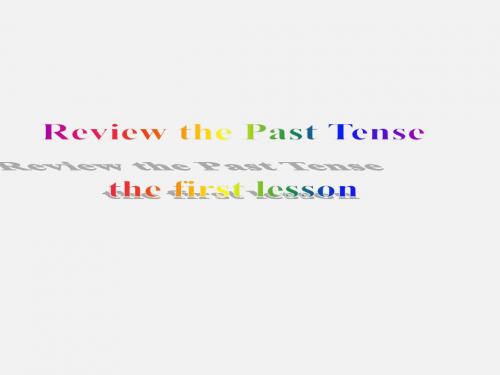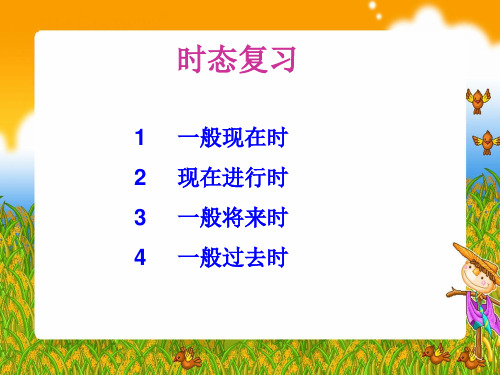- 1、下载文档前请自行甄别文档内容的完整性,平台不提供额外的编辑、内容补充、找答案等附加服务。
- 2、"仅部分预览"的文档,不可在线预览部分如存在完整性等问题,可反馈申请退款(可完整预览的文档不适用该条件!)。
- 3、如文档侵犯您的权益,请联系客服反馈,我们会尽快为您处理(人工客服工作时间:9:00-18:30)。
起床 吃早饭 上课 吃午饭 休息 做运动 吃晚餐 做家庭作业 看电视 上床睡觉 get up have breakfast start lesson have lunch have a break do sports have dinner do homework watch TV go to bed
规则动词过去式的构成 构成规则 1、一般在动词原形末尾加– ed look play start live hope use stop plan trip study carry 例词 looked played started lived hoped used stopped planned tripped studied carried
各时态常用的信息词
现在进行时: now , Look! Listen! at this time Where is …? Don’t talk! It’s 8:00am. always , usually, often, sometimes ,seldom, never, every day, every… ,three times a day
3、有时我们在操场上踢足球 。 4、我们在学校吃晚饭。 5、他喜欢英语。
He likes English. He is a student.
6、他是一个学生。
Do you know?
第一人称和第二人称的一般现在时,其谓语动词没有形式的变化, 其否定形式一般是在谓语动词前 don’t,一般疑问句在句前加do 但当主语是第三人称单数时,谓语动词形式有变化,一般在动词
一般者反复发生的动作 信息词:
often(经常) always(总是) every day(每天) every month(每月) sometimes(有时) usually(通常) every week(每周) every year(每年)
Let’s remember: Do you remember the words in your life? 你记得你生活中的一些常用词汇吗?
现在进行时:
(The Present Continuous Tense)
现在正在进行的动作
时 一般现在时:经常或习惯性的动作或 态 (The Simple
Present Tense)
存在的状态。
一般过去时: 过去某个时间或时间段发 (The Simple 生的动作或存在的状态。 Past Tense)
对下列句子画线部分提问: 1. I get up at six o’clock.
When do you get up?
2. They usually go to the park on Sunday.
What do they usually do on Sunday?
What do the elephants like eating?
PRACTISE
改写句子: 1、Lucy did her homework at home.(改否定句) didn’t _______ do her homework at home. Lucy _______ 2、He found some meat in the fridge.(变一般疑问句) Did find ______ any meat in the fridge? ______ he _____ 3、She stayed there for a week.(对划线部分提问) How ______ long _____ did she _____ stay there? ______
I _am___ twelve years old this year. I was eleven years old last year .
He is in Beijing now. 他现在在北京。 他昨天在上海。 He was in Shanghai yesterday. 他们今天在中国。 They are in China today. 他们昨天在日本。 They were in Japan yesterday.
2、结尾是 e 的动词加 -- d
3、末尾只有一个辅音字母的 重读闭音节词,先双写这 个辅音字母,再加—ed 4、结尾是“辅音字母+y”的动 词, 先变“y”为“i”再加—ed
不规则动词过去式:
• • • • come-came go-went do-did have/has-had draw-drew fly-flew drink-drank begin-began give-gave swim-swam take-took
末尾加s,否定句在行为动词前加doesn’t, 一般疑问句在句前加
does
动词三单的变化: 1、一般动词后加s,如:reads,plays,works,makes 2、以 s,x,ch,sh, 结尾,后加es. 如:watches, 3、辅音字母+y结尾的单词,去y,加ies,如:worries studies
I cleaned the room yesterday.
一般过去时:Past Simple
表示过去发生的动作或存在的状态
构成:动词的过去时
She studied at home yesterday.
常用时 间
常与一般过去时态连用的时间有:
yesterday yesterday morning (afternoon, evening…) last night (week, month, year…) two days ago, a week ago, in 1990, (in 1998…) three years ago…
动词第三人称
①直接加-s. ②以s, x, ch, sh, o结尾加-es. ③以“辅音+y “结尾变y 为i再加-es.
单数的构成:
①直接加-ed. 过去式 的构成: ②以e结尾只加d. ③重读辅元辅,双写尾字母再加-ed.
④以“辅音+y”结尾变y 为i 再加-ed.
表格对比学习
对比 动词形式 时态 现在进 be+v-ing 行时 (现在分词) 一般现 在时 一般过 去时 V -原形 V-三人单 V-ed (过去式) 否定句 在be 后 加上not 一般问句 Be提到 句首 在行为v.前借用 Do,Does do ,does后加not, 提到句首, 行为动词 行为动词还原 还原 在行为v.前借 用did后加not, 行为动词还原 Did 提到句 首,行为 动词还原
3. My mother _________(watch) TV play every day. watches
4. Old Bush ________(visit) China again last month. visited
5. I ______ play (play) sports three times a day. 6. Look! Lucy and Lily ____________(read) books. are reading 7. There _______(is) a football match yesterday afternoon. was 8. Our class ______( went go) to the zoo three days ago.
一般现在时:
last night, last…, two days ago, …ago,
一般过去时: in 1999, in +过去的年份, just now =a moment ago,
yesterday,
yesterday morning
现在分词 的构成:
①直接加-ing. ②重读辅元辅,双写尾字母加-ing. ③以e 结尾去e加-ing .
3. The elephants like eating fruits.
4. He sends two emails every week.
How many emails does he send every week?
How often does he send two emails?
5.I often make travel plans on the Internet.
结构: be (is, am, are) + doing
肯定句:sb+be+v.ing+… 否定句:sb+be+v.ing+… 疑问句:Be+sb+v.ing? 特殊疑问词+be+sb+ving?
标志语: Look! 、 Listen! 、now
动词-ing形式的构成:
一般在动词原形后 +ing 以不发音的e结尾的, 去e,+ing 重读闭音节以一个辅音 字母结尾的,双写这一 字母+ing
定义: 一般现在时:1、表达经常性或习惯性的动作。 2、表示现在的状态。 例如: 1、我们每天都上学。
We go to school every day.
2、下课后我们打扫教室。
We clean the classroom after class. We sometimes play football on the playground. We have dinner at school.
• get-got write-wrote tell-told • eat-ate am/is-was are-were see-saw • spend-spent make-made put-put read-read
Please look at the following sentences
我今年12岁。 我去年11岁。
4、There was some orange in the cup.(变一般疑问句) Was there _____ any orange in the cup? _____





